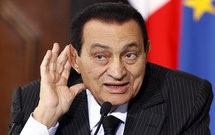 An Egyptian appeals court on Jan. 13 overturned former President Hosni Mubarak's life sentence for direct involvement in the killing of protesters and ordered a retrial. Mubarak, who is believed to be in frail health, will remain in custody at a military hospital while a separate investigation on corruption charges is carried out.
An Egyptian appeals court on Jan. 13 overturned former President Hosni Mubarak's life sentence for direct involvement in the killing of protesters and ordered a retrial. Mubarak, who is believed to be in frail health, will remain in custody at a military hospital while a separate investigation on corruption charges is carried out.
The lack of closure to the Mubarak case will heighten political tensions in the lead-up to the Jan. 25 anniversary of the uprising that uprooted the Mubarak regime. This could undermine the Muslim Brotherhood's position as it prepares for parliamentary elections slated for April.
Analysis
Egyptian President and Islamist leader Mohammed Morsi campaigned on bringing Mubarak to justice and closing a major chapter in Egypt's history to make way for a new order. To this end, the Morsi government appointed a fact-finding commission to investigate the security crackdowns that marked the 2011 uprising and appointed a new general prosecutor, hoping to re-address what he and many of his supporters perceived as a weak conviction of the former leader. Whereas the earlier verdict handed Mubarak a life sentence for his complicity in the violence against protesters, Morsi pledged to his supporters that he would seek a retrial to examine evidence that Mubarak ordered the killings during the uprising and to implicate the former president for other abuses during his rule.
However, the Muslim Brotherhood has regularly collided with the country's powerful judiciary, military and security apparatus, which, while not always united in their political aims, largely share a strong interest in preserving the old system and keeping Islamist political power in check. The decision by the appeals court to overturn the verdicts on Mubarak, his two sons and several former members of his inner circle could again reveal the constraints faced by the Muslim Brotherhood government if the retrial does not result in a strong sentence against Mubarak.
So far, the courts have demonstrated a propensity to work against the Muslim Brotherhood government; the retrial is unlikely to be an exception. The judge presiding over the trial that gave Mubarak a life sentence criticized the prosecution for presenting a case lacking in concrete evidence. The fact-finding commission appointed by Morsi has since presented a 700-page report, including evidence that Mubarak watched the crackdowns through a live TV feed at his palace. It remains to be seen whether the country's high court will validate the evidence in a retrial (which has yet to be scheduled), especially since the report would also implicate a number of senior security officers. Those with business interests entrenched in the old establishment do not want these trials to gain momentum and give the government the confidence to pursue anti-corruption cases that could threaten those interests.
Protests on both sides of the political divide have become routine in the post-Mubarak political environment, and this latest controversy will further exacerbate tensions. But the scuffles over the Mubarak legacy pale in comparison to the coming crisis the Egyptian government faces in trying to keep the country's economy afloat.
Tenuous Economic Imperatives
On Jan. 17, an International Monetary Fund technical team will return to Cairo to resume negotiations over a $4.8 billion financing package that will include necessary but highly unpopular austerity measures, including tax hikes and cuts to electricity and fuel subsidies. Egypt has already reached a critical threshold -- it was announced last month that the country's foreign currency reserves had dipped to roughly $15 billion, barely enough to cover the cost of three months of imports. The government's stalling on the International Monetary Fund loan has raised the prospect of a disorderly devaluation, which would have negative implications for the country's ability to import petroleum products and basic foodstuffs. Egypt must also repay more than $1 billion in debt over the next six to eight weeks, including $900 million this month.
The Islamist government would likely rather wait until after the April elections before implementing unpopular austerity measures. An aid transfer from Qatar made in December may help the government drag out negotiations for the sake of maintaining popular support at home, though this may further undermine investor confidence abroad. With another $2 billion deposited into the Egyptian Central Bank and a $500 million grant, Qatar's aid package to Egypt now totals $5 billion. But that money is also fast being spent on defending the Egyptian pound as the Central Bank struggles to stave off a rush on dollars in the local market.
The Muslim Brotherhood is facing a major dilemma in the weeks ahead as it tries to balance between its political and economic imperatives. The lack of resolution to the Mubarak case will only complicate the government's ability to navigate the economic crisis. At the same time, it will provide an opportunity for those keen on preserving the old order to chip away at the Brotherhood's popularity ahead of elections.
Courtesy : Stratfor (www.stratfor.com)